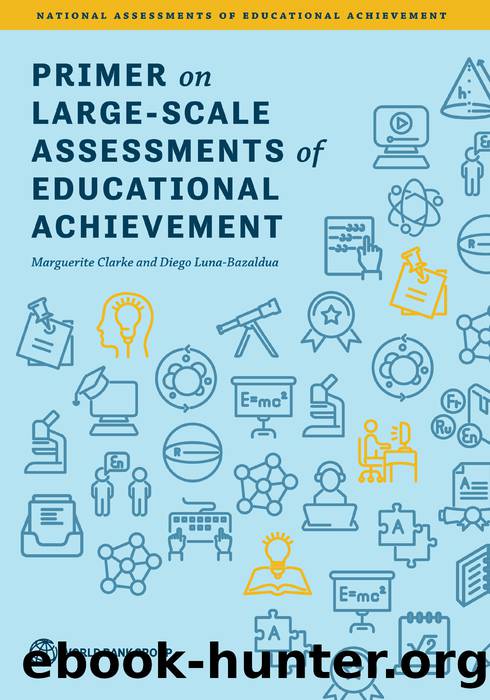Primer on Large-Scale Assessments of Educational Achievement by Marguerite Clarke & Diego Luna-Bazaldua

Author:Marguerite Clarke & Diego Luna-Bazaldua
Language: eng
Format: epub
How Should Students with Special Education Needs Be Assessed?
Ministries of education, national assessment agencies, and other organizations behind the development, administration, and use of large-scale assessments and high-stakes examinations are increasingly flagging challenges with assessment of students with special education needs. The professional standards for educational assessment highlight the importance of producing standardized assessments that facilitate accessibility for all students, as far as practicable. The assessment development process should adhere to the principles of universal design, which is based on the tenet that assessments must maximize accessibility and fairness for all students, irrespective of their personal characteristics (AERA, APA, and NCME 2014; ETS 2014).
Assessment teams should consider a variety of accommodations and adaptations for making assessments more accessible to students with special education needs. The specific accommodations or adaptions depend on the objective of the assessment, the knowledge domain measured, and the needs of specific groups or individual students (for example, physical, sensory, cognitive, and linguistic). These accommodations or adaptations should permit greater comparability of scores without affecting the validity or reliability of the assessment results. Effective accommodations or adaptations remove barriers to student performance without providing an unfair advantage over others who do not receive them (AERA, APA, and NCME 2014; ETS 2014).
Examples of some assessment accommodations include test forms in braille, large-print booklets and answer sheets, magnification devices for visual materials, read-aloud supports during the assessment, headphones or other audio devices, and extended time for assessment administration or multiple testing sessions.
Download
This site does not store any files on its server. We only index and link to content provided by other sites. Please contact the content providers to delete copyright contents if any and email us, we'll remove relevant links or contents immediately.
Lean Lesson Planning: A practical approach to doing less and achieving more in the classroom (High Impact Teaching) by Mccrea Peps(1586)
Parent Talk by Chick Moorman(707)
The History of Work by Richard Donkin(678)
Fooled by Randomness: The Hidden Role of Chance in Life and in the Markets(645)
Cracking the Praxis Tests (Core Academic Skills + Subject Assessments + PLT Exams) by Princeton Review(590)
Big Questions in ELT by Scott Thornbury(571)
Engineering Graphics with AutoCAD 2020 by James D. Bethune(537)
National Reflections on the Netherlands Didactics of Mathematics by Marja Van den Heuvel-Panhuizen(501)
Color Your Message: The Art of Digital Marketing and Social Media by Lisa Caprelli(487)
My Growth Mindset Journal by Annie Brock(480)
The Mediator's Toolkit by Gerry O'Sullivan(469)
ANIMAL ACTION by Unknown(467)
Contemporary Research in Adult and Lifelong Learning of Mathematics by Katherine Safford-Ramus & Jürgen Maaß & Evelyn Süss-Stepancik(458)
Electrical Power Simplified by Dr. Prashobh Karunakaran(438)
Becoming an Academic Writer: 50 Exercises for Paced, Productive, and Powerful Writing by Goodson Patricia(432)
Teaching Boys Who Struggle in School: Strategies That Turn Underachievers into Successful Learners by Cleveland Kathleen Palmer(432)
Educational Trauma by Lee-Anne Gray(406)
The Side Hustle by Nick Loper(405)
The Models of Engaged Learning and Teaching by John Willison(404)
